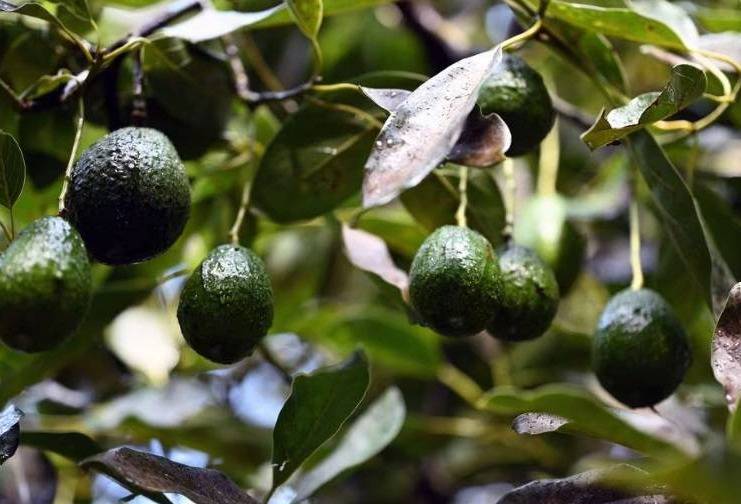
Avocados in an orchard. (Credit: AFP)
In recent years, avocado cultivation has undergone an extraordinary expansion in Lebanon, with projections reaching four times the output of the previous year and 25 times that of 2018.
While the region has long enjoyed favorable climatic conditions, it is only in recent times that this crop has gained significant traction among farmers, who traditionally concentrated on citrus fruits.
Lebanese avocados are gaining popularity domestically but have also made notable inroads into the European market. What factors have contributed to this phenomenon? L’Orient-Le Jour delved into the intricacies of this burgeoning industry.
Avocado cultivation has been practiced in Lebanon for approximately four decades. It has undergone shifts amidst several crises that affected the agricultural sector. This was notably at the expense of citrus fruit production, which previously held dominance.
“In the early 2000s, a decline in orange exports to the Gulf States prompted a shift in farming practices,” said Antoine Hoyek, President of the Lebanese Farmers’ Union. “Farmers, in response, pivoted towards cultivating bananas, primarily catering to the Syrian market.”
However, with the eruption of conflict in Syria, economic ties between Beirut and Damascus faltered, dealing another blow to farmers. Faced with limited avenues for market diversification, they sought refuge in avocado production as a viable alternative.
Environmental and economic benefits
According to experts L’Orient-Le Jour interviewed, growing avocados offers several environmental and economic advantages compared to other local agricultural products.
“Avocado cultivation proves to be more cost-effective than citrus farming, which demands greater input in terms of maintenance [such as watering, fertilizers, etc.],” said Mohammad Hijazi, a pioneering producer who established the benchmarks for this agricultural approach in the 2000s, drawing insights from an American study.
Moreover, this form of cultivation yields higher profits, with farmers earning between $1.5 and $2 per kilogram compared to the 15 to 20 cents garnered from citrus fruits.
Additionally, avocado trees boast higher yields, producing up to 500 kilograms per day, in contrast to the 200 kilograms typically harvested from citrus trees.
Hoyek underscores the significance of the environmental aspect, noting that avocado production is less susceptible to climate change impacts compared to other crops.
“Avocado trees flourish in temperatures reaching up to 38 degrees Celsius, at altitudes of up to 700 meters,” said Simona Tannous, an agricultural engineer. “These conditions are conducive to cultivation along the coast in the south and north.”
Conversely, the Bekaa Valley and the Lebanese mountains lack these favorable conditions and are deemed unsuitable for avocado cultivation. This is because the roots of avocado trees are susceptible to damage in such environments.
The McKinsey firm endorsed avocado production in its 2018 study on the Lebanese economy and emphasized sectoral diversification to bolster productive sectors and exports. Avocado production has now garnered support from various initiatives established in recent years.
In 2012, the US Agency for International Development (USAID) launched the seven-year Lebanon Industry Value Chain Development (LIVCD) project, which includes initiatives to foster avocado cultivation.
Furthermore, other projects, including those funded by the René Moawad Foundation, have facilitated farmers in obtaining certification from the Global GAP agency. This certification underscores adherence to good agricultural practices, a prerequisite for exporting to the European Union and United Kingdom markets.
However, the impact of these initiatives remains secondary for Antoine Hoyek, the president of the Farmers' Association, who believes that the agricultural sector “evolves naturally as per the market needs and independently of foreign contributions.”
Gulf and European markets
This development is palpable among Lebanese growers. While Lebanon planted 40,000 avocado trees in 2018, it planted 75,000 in 2022 and 250,000 in 2023, said Mohammad Hijazi. This figure has quadrupled this year, with a million trees planted in the country.
This naturally led to an increase in avocado production, with quantities exceeding local demand. To sell off their stocks, avocado growers are increasingly turning to foreign markets. According to Lebanese customs, Lebanon exported 8,881 tons of avocados in 2022, compared with 7,743 tons in 2021 and 4,743 tons in 2020.
Arab countries are first in line when it comes to the main destinations. According to customs, the main importers of Lebanese avocados are Jordan (36.9 percent), Egypt (28.7 percent), Iraq (19.4 percent), Kuwait (4.2 percent) and the UAE (3.25 percent).
Europe has also turned to Lebanese avocados, after it failed to meet its needs via other exporting countries, including Israel. “Between November and March, avocado production in North and Latin America was insufficient for European countries,” said Hijazi. This allowed local avocados to make their way into these markets.
Between December 2023 and March 2024, around 600 tons of avocados were exported to Europe, notably to Germany, Belgium, France and the Netherlands. These exports amounted to only 211 tons for the 2022 fiscal year, according to figures from customs.
Today, the development of avocado production is evidently on the right track. Could turning to new markets help this branch develop even further? This is what Hijazi hopes for. “The aim is to export 3,000 tons of avocados to Europe per year within the next three years,” he said.
This article was originally published in L'Orient-Le Jour. Translated by Sahar Ghoussoub.